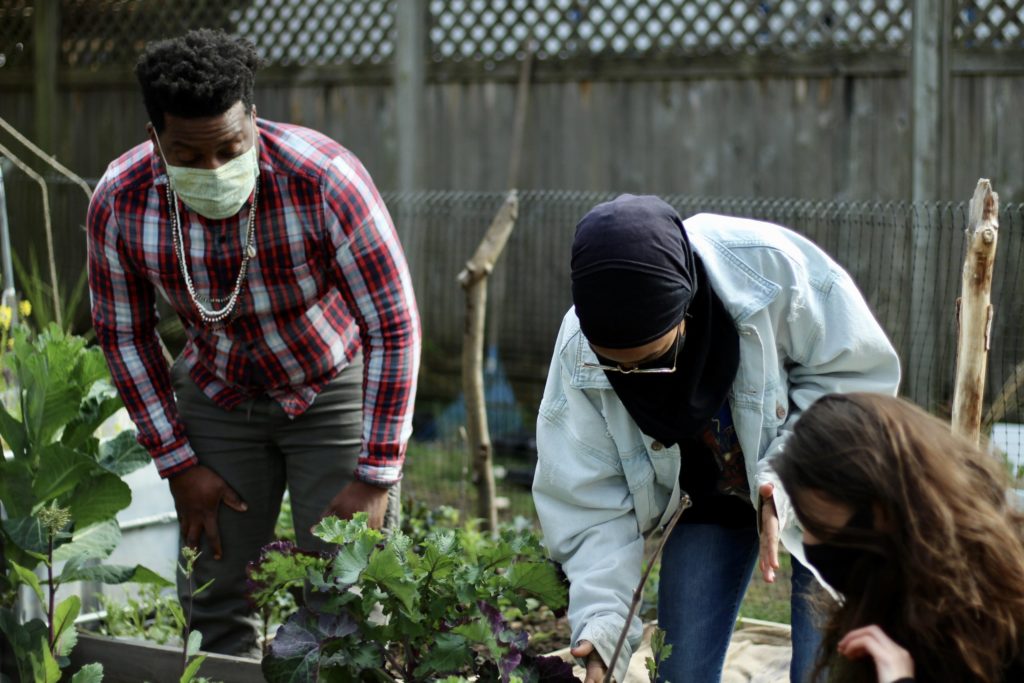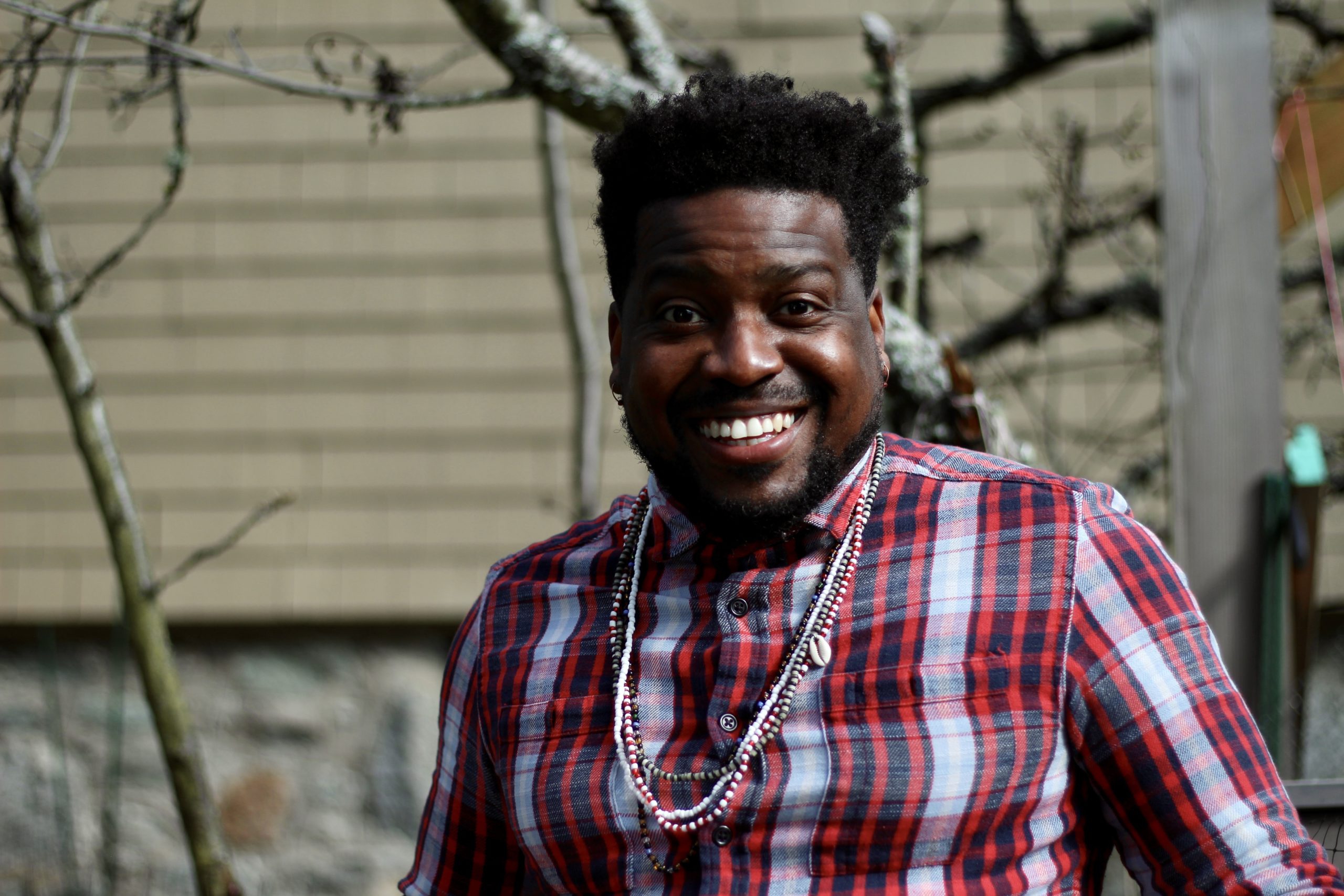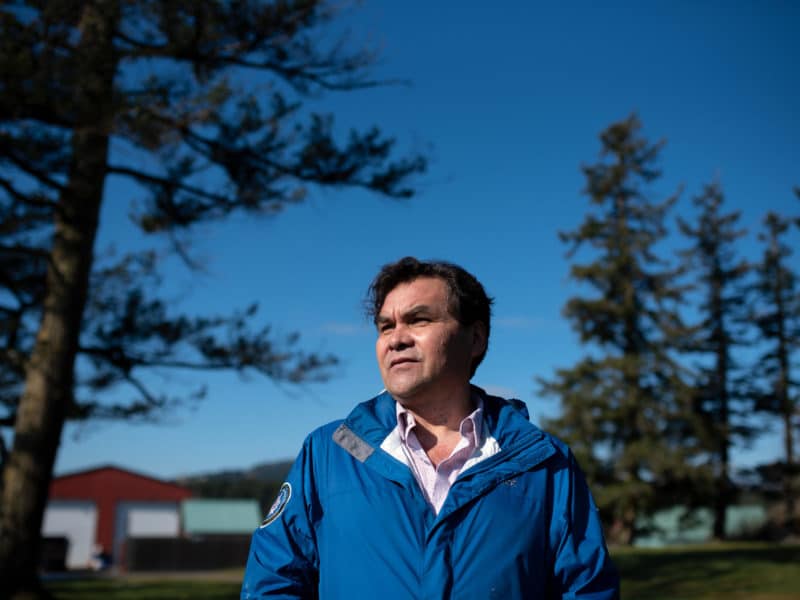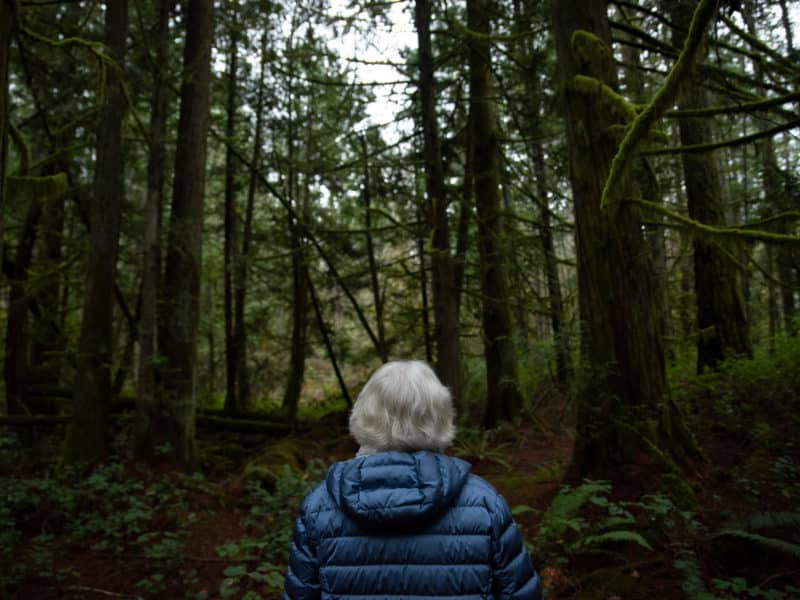
Food is essential for life. This much is simple. But the creators of a Victoria-based social enterprise will tell you that food is much more than that.
Iyé Creative focuses on supporting people from disenfranchised communities, with the goal of restoring their connection and relationship to the land. Food connects people to the land, their cultures, Indigenous knowledge systems and serves as a tool to heal, the group’s leaders say. It gives people agency and strengthens community.
What started as a project to bring compact vegetable gardens to people struggling to access healthy foods has grown into something much bigger. Eventually, the group wants to run a cultural centre where people can gather to connect with food, land and each other.
“We’re creating a food ecosystem,” says Ariel Reyes Antuan, cofounder of Iyé Creative. “We’re raising awareness and understanding that we come to the land from the land and we’re going back to the land. We’re teaching people, we’re educating.”
They’ve undertaken the large job of not only connecting with people in Greater Victoria to learn about their relationships with food and culture, but to help them break through structural barriers to access land and nutritious food.
The team at Iyé sees their work as a reawakening, as a re-introduction to knowledge systems that have been around for centuries. They’re working towards a decolonized model of community learning, sharing and growing in the hopes that other communities can do the same.
The birth of Iyé
Upon first glance, the Iyé Creative headquarters are unassuming. The grassroots initiative was born out of the downtown Victoria home of Iyé cofounders Ariel Reyes Antuan and Jess Barton.
Barton and Reyes Antuan share a passion for food, connection, long-term relationship building and learning about traditional practices.

Reyes Antuan has roots in Santiago de Cuba, Cuba. The Iyé website describes the cofounder as a “community connector, Afrofuturistic, systematic thinker.” Barton, born in B.C., has been involved in “anthropological and archaeological research-based projects that favour long-term and respectful relationship building with First Nation communities,” the website says.
The pair met when Barton was working and learning in Cuba. Since then they’ve managed to not only build a home for themselves in Victoria, but a community too.
The couple started inviting people into their home for a cooking class, hosted as an AirBnB experience, before the COVID-19 pandemic. Visitors would gather in their kitchen for a lesson and discussion about nutritional components of recipes as well as how each meal nourishes them. They then turn the class into a dinner party, rounding it out with Afrobeat music and chats over their just-cooked meal.
In 2020, Barton and Reyes Antuan took on a new project to help marginalized individuals become more food secure. Inspired by work being done by REFARMERS in Vancouver, the couple started Palenke Greens. Using traditional methods developed in Africa, the Palenke Greens program helps racialized and marginalized community members grow food in whatever space they have available — be it a patio, the corner of a balcony or a yard. Barton and Reyes Antuan educate program participants on growing methods and install burlap sack gardens at participants’ homes. The burlap sacks, large and tall, are filled with soil and vegetable plants that come out of the top and sides of the sacks.

In 2020, the couple installed more than 50 burlap sack gardens in households across the Capital Regional District. They received funding and materials from community members and the City of Victoria.
Each garden was a learning opportunity, for participants and for Barton and Reyes Antuan. They shared stories with community members and learned about their struggles as well as their own connections to food and land. With the success of the Palenke Greens initiative, the couple decided to expand into a larger social enterprise.
Related story: Little Zimbabwe Farm offers a cultural exchange through food and music
“Iyé is evolving,” Reyes Antuan says. “We want to integrate community-based research with empowering tools. We’re going deeper into food systems and what’s happening in our community.”
More than just numbers
Through their work, Barton and Reyes Antuan realized there was a lot to learn from community members. They also saw a need to collect and disseminate information and data to raise awareness about issues around food. In came Asiyah Robinson.
Robinson is a University of Victoria graduate and is leading community-based research at Iyé. While she deals with data and statistics, she says she believes the research they’re doing is more than just numbers.

“It’s about connecting to people,” Robinson says. “It’s about getting stories, people’s energy, understanding emotion … I think we’re all understanding that we can’t move forward without talking to our people.”
Born and raised in the Bahamas, Robinson says she had a backyard abundant with fruit. She grew up knowing where her food came from, including fish caught by her fisherman grandfather. Robinson says coming to Canada, a place where she couldn’t find the same foods or know exactly where her food was coming from, was a big change for her.
Through her research, she says she’s noticed a growing desire amongst community members to grow their own food and understand where it comes from.
“Food isn’t just about feeding your stomach, it’s about feeding your soul,” Robinson says. “And if you’re not providing your body with the right nutrients that are tied to your culture, your lineage, your ancestry, there’s so much more damage that comes with that.”
Community Food Centres Canada defines food insecurity as people being unable to afford good food or being at risk of not being able to afford it. The organization says food insecurity breaks down relationships and affects people’s health, including mental health, and limits people’s abilities to celebrate their own culture.
Some definitions go farther than affordability. Cowichan Green Community’s Cowichan Food Charter, for example, says that “Food security exists when ALL members of our community have access to enough nutritious, safe, ecologically sustainable, and culturally appropriate food at all times.”
According to Community Food Centres Canada, one in eight Canadians struggles to put good food on the table for themselves and their families. The COVID-19 pandemic increased that to one in seven.
Related story: COVID-19 peels back the curtain on food insecurity on Vancouver Island
With Iyé, Robinson works to unpack how aspects of being human — such as mental health and connection — are linked to food. From that foundation of deeper understanding, she hopes to put together a series of next steps to help build connections between community members, the land and food.
A ‘food apartheid’
An impact report from Iyé about its program, Palenke Produce Boxes, includes some of the research Robinson and the organization conducted about food security in Greater Victoria communities. The program provides fresh produce boxes, sourced from Vancouver Island, to households facing food insecurity. The goal is to support community access to fresh food while reinvigorating connection to the land and relationships with food.
The program’s impact report points to the term “food apartheid” — an intersection of race, income, geography and access to transportation and how it results in food access inequities. The term comes from American activist and community organizer Karen Washington. In an article for Guernica, Washington says she prefers the term “food apartheid” over the more commonly-used “food deserts.” She says the latter calls on images of dry, desolate places without potential whereas the former brings up social inequalities and potential for change.
“The effects of a food apartheid do not only exist in respect to food access,” the Iyé report says. “They can also be seen in the impact they have on the cultural well-being of communities which have been historically oppressed.”
The report goes on to note that issues like suppression of Indigenous food sovereignty, lack of land access, overdependence on easy-to-consume food products and more can lead to loss of knowledge, including global Indigenous agricultural knowledge.
Through community engagement, Iyé learned that there are not many racialized individuals in Greater Victoria with active roles in the food system or local food initiatives, the report says. Lack of education also serves as a barrier to engagement in local food systems. Having learned this, Iyé is working to lift up racialized voices in the world of food by providing them with education and tools.
Iyé’s program, Palenke Produce Boxes, helped 64 households in the Victoria region access fresh, local food in 2020. Participants filled out a survey to help provide some more information about food access in the community. According to the impact report, the majority of the participants were receiving food boxes to support themselves and at least one dependent. About 30 per cent of the participants lived in combined-income households and said it still wasn’t enough to access nutritional food.
Moving forward, the report says Robinson will lead research looking at food consumption habits of the community as well as the most immediate obstacles people face to food access. The organization is advocating for government interventions to invest in income and food security for communities and hopes initiatives like Iyé can partner with governments to make people more food secure.
Storytelling, food and connection
In addition to providing people with food and methods to grow food, Iyé is also increasing its focus on educational resources. This includes providing people with nutritional and culturally appropriate recipes, tutorials and engagement online through storytelling, documentaries and social media. Jumana Risheq, a creative director working with Iyé, leads the storytelling projects.
Risheq came to Iyé before the COVID-19 pandemic. A medical herbalist by profession, she worked with Barton and Reyes Antuan to put together educational components around nutrition, which could be shared with community members through cooking classes and dinner parties.

Risheq is a second-generation Palestinian refugee who grew up working in refugee camps in Jordan. She says when working in the camps, she helped people find healing and sovereignty through culture. As she continued her work, she started to shift her focus to the land, herbal medicine and nutrition.
“I started to realize how much of culture and sovereignty and political reparations were tied up in our relationship to land and cultures,” Risheq says.
Risheq became involved in the Palenke Produce Box initiative and started finding ways to use storytelling as a tool for education and liberation. To her, storytelling became a place where people could talk about food and everything that comes with it — like spirituality, justice, humanity and policy change.
“Food plays this really integral role of being the pinnacle on which all human systems rotates around,” Risheq says.
Through a project called Living in Liberation, Risheq and Iyé are telling stories that demonstrate how food is woven into spirituality, land, culture and more. They’re creating a documentary series around these themes as well as an online educational platform, which community members can access to learn things like how to cook using food growing around them and how to incorporate cultural elements into food. The project will launch this summer.
The organization also plans to hold Palenke Socials, where people can gather online, have conversations about food and land, watch videos and learn from each other.
“We’ll have real dialogue from the people on the ground about what they need and how they need it in order to feel their own freedom and their own liberation,” Risheq says.
The Iyé dream
Looking at the progress they’ve made in such a short amount of time, Reyes Antuan says he wants to keep this momentum going.
For Iyé, the dream has always been to explore land-based approaches to find healing for Black, Indigenous and people of colour (BIPOC) in the community. The organization hopes to decolonize “mind, body and spirit,” and allow for connection between land, food, culture and people.
After feeding and educating community members with burlap sack gardens and Palenke Produce Boxes, Reyes Antuan says Iyé is looking to expand. The organization wants to create a cultural centre. It would be a long-term physical space where people can train, educate and build relations with the land all while prioritizing BIPOC voices and connections to ancestral ways of knowing and being.
The next questions the organization is asking itself is, “How can we access land? What are the best solutions to make it happen?”
“Imagine if we have a centre that isn’t only based on food production but is about how we can enjoy producing food … connecting with what comes from the land and the way we relate to each other,” Reyes Antuan says. “At Iyé, one of the dreams is to decolonize the way we live in community and create a living blueprint of what can be. We’re tapping into what’s possible.” [end]
This Food For Thought article is made possible in part with funding from the Real Estate Foundation of BC and Journalists for Human Rights/RBC. Their support does not imply endorsement of or influence over the content produced.



